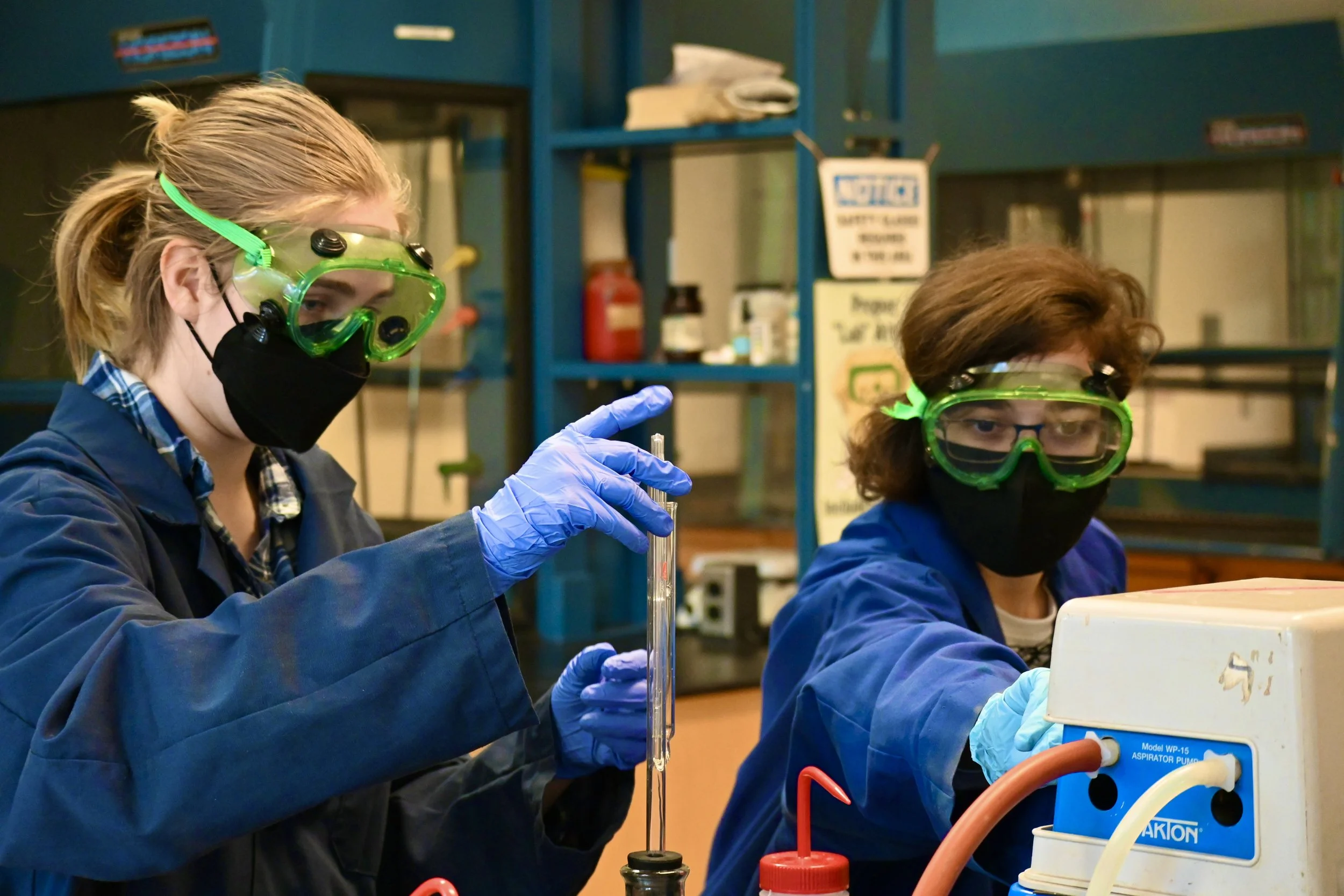The Silent Orchestra of the Chemistry Department
Ciara McOmber | March 24, 2022
Ruby Jane Moser
Ev Mauger and Patrizia Mombille, of Chemistry Crew, working in the instrument lab.
In a little-known corner of Warren Wilson College (WWC), there is a room full of instruments with the potential to analyze anything. These instruments do not create music; they analyze samples and display what they are made of. The analytical chemistry laboratory is open for students and work crews to make use of and has seen extensive use in WWC’s ongoing hemp-growing project as well as a variety of Natural Science Undergraduate Research Sequence (NSURS) projects managed by students.
“I take some liquid I don’t know about, stick it in a box, and it tells me what it is,” said Fred Dinsmore, a junior chemistry major and Chemistry Crew member.
The instruments of the lab are diverse and complex in their form and functions. Faculty with expertise in such instruments are vital.
Amid the wave of retirements towards the end of the 2021 spring semester, the departure of Matt Burleson, lab manager, instrumentation specialist and Chemistry Crew supervisor, was met with little fanfare. Even so, the reverberations have been felt throughout the chemistry department. Burleson managed the instrumental lab and taught classes on general chemistry and instrumental analysis.
“Matt was a once in a lifetime kind of professor. He was really great,” Dinsmore said. “When he was here, he did almost all of the instrument maintenance.”
Given that Burleson left so late in the semester, the instrumental methods course planned for the fall 2021 semester was canceled. Nobody remained to teach it and a new professor could not be hired quickly enough. The course is mandatory for biochemistry and chemistry majors, making the search for a new professor ever more urgent.
The instrumental lab has seen even less traffic without a professor to manage it.
“We’ve been doing a lot less with it this semester,” Dinsmore said. “ Really, we just get an occasional NSURS project now … It’s just a shame.”
Despite the challenges of the situation, with the effort of the chemistry department and students, the lab has continued to function. Mason Hopkins, a senior biochemistry major, completed her NSURS using the instrumental lab.
“I was continuing to develop the analytical method to analyze the CBD in the hemp grown here on campus,” Hopkins said. “ I was playing around with different temperatures and different times to see which worked the best to get the highest CBD concentration.”
Hopkins isn’t the first to work on such a project. She picked up a project that another student had worked on for their NSURS in 2019 and hopes that her work will in turn be utilized by future students.
“The overall goal for our project was to develop a method that biology or environmental studies students could use to analyze the hemp in the lab,” said Hopkins. “There’s actually a student who is going to be using our method in the lab!”
Although Burleson’s absence has been felt strongly, his presence still persists. Facing difficulties with the use of some instruments, Hopkins and other members of the department reached out to him for help.
“We’ve called Matt more than once already. He has a soft spot for Warren Wilson,” said Robert “Rusty” Bryant, adjunct chemistry professor.
Although the department may be in need of an instrumental specialist, the ragtag team of student researchers, professors and Burleson, if only on the phone, have made the lab quite usable.
“We’re moving along, maybe not on all 4 cylinders, but so far 3 cylinders is working pretty well. I think the equipment is still working reasonably well, and you can get a lot done with it,” Bryant said.
The instrumental lab is a useful option for natural science students and work crews alike. Only time will tell how the department evolves as it searches for a new instrumental specialist.
“I don’t think students understand exactly what they have available,” said Dinsmore. “You can use it to determine just so many things! Like coffee! Matt tested the caffeine in coffee and found out they didn’t put caffeinated coffee in Gladfelter. People at the farm get their hay tested. You can come just get things tested if you want to look at chemical stuff. I just think it’s really cool and wish more people knew it was available and they had access to it.”


